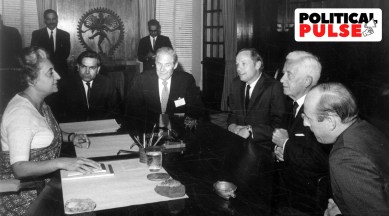India and the Moon: 1969’s year of turmoil, and one moment that surpassed it
In her message on man landing for the first time on Moon, PM Indira Gandhi called it a symbol of "the irresistible spirit of man"... "the spirit which crosses oceans on a bundle of reeds and leaps from one celestial body to another in a small vehicle of its own making”

INDIA’S third lunar mission and second attempt to land on the Moon set off on Friday afternoon, with a tentative deadline a month from now. A lot rides on the project given the failure of Chandrayaan II in its mission in the last moments.
Space exploration has seen its many moments, but the Moon retains a special place as the one interspatial object which humans have touched down upon.
monthly limit of free stories.
with an Express account.
It was a little over half a century ago that Neil Armstrong and Buzz Aldrin became the first people to set foot on the Moon, on July 20, 1969. India was going through the pangs of bank nationalisation, there was turmoil within the ruling Congress which would eventually lead to concentration of more and more powers by an insecure Indira Gandhi as Prime Minister, finally resulting in the Emergency six years later.
But the sentiment of that moment, of “a small step for man, a giant leap for mankind”, overrode all these underlying tensions. The capsule of the Apollo 11 aircraft carried messages from across the world’s leaders, and Indira Gandhi’s read: “This unique occasion when man traverses outer space to set foot on Earth’s nearest neighbour, Moon, I send my greetings and good wishes to the brave astronauts who have launched on this great venture. I fervently hope that this event will usher in an era of peaceful endeavour for all mankind.”
The Congress government also made arrangements to cover the historic event. On July 15, it was announced that the Apollo-11 lunar broadcast will be made on All India Radio in a programme titled “Spotlight”. A special correspondent would be sent to Paris to report on the launch, the release noted.
On July 21, a day after the landing, the PM hailed it as “one of the most exciting and significant moments in the history of man”. As per a Press Bureau of India (PIB) note, Gandhi said Armstrong and Aldrin were “delegates of the irresistible spirit of man – the spirit which discovered fire and thought, song and science, the spirit which crosses oceans on a bundle of reeds and leaps from one celestial body to another in a small vehicle of its own making”.
“This moment of triumph and achievement is also a moment of humility and self search,” she wrote, adding: “Has man who seeks heavenly suburbs, made his own Earth more habitable, friendly and beautiful? Let us direct this power of man which soars starwards into strengthening the bonds of peace and brotherhood on Earth.”
All India Radio also broadcast a discussion titled ‘Flight to Moon’ with eminent individuals from the Planning Commission, and scientists, among others, while the Films Division released a newsreel capturing the historic event.
Later that year, in November, the government launched a special stamp to depict man on the Moon’s surface.
The euphoria of the Moon landing was an opportune break for the beleagured Indira Gandhi-led government. The Congress had won the 1967 elections but had seen its majority drop while a Syndicate of old Congress leaders in the Congress was posing a challenge to her complete control over the party. Indira Gandhi needed something to capture the national imagination, and the nationalisation of private banks was seen as one such move.
Many senior Congress leaders such as Y B Chavan, Jagjivan Ram and K Kamaraj pressed for urgent takeover of private sector banks. The opposite group was led by Morarji Desai, the Deputy PM and Finance Minister. Desai conceded that the promise made to the electorate to do so had to be fulfilled, but pleaded for a cautious approach.
By December 1967, the scheme for ‘social control’ was ready. Desai agreed that the traditional links of banks with industrial and business houses needed to be snapped and that credit decisions should be conforming to the needs of priority sectors like agriculture, small-scale industries and exports. By early 1969, a Bill to this effect was passed and enforced.
The government also created a National Credit Council (NCC) to assess the demand for bank credit from various sectors of the economy and to determine priorities for the grant of loans.
On July 9, 1969, Indira Gandhi mooted nationalisation of major banks. A history of the RBI notes: “But Indira Gandhi had, by then, decided to confront the Syndicate in what was a bid to wrest control of the party. She needed a dramatic issue and bank nationalization fitted the Bill.”
The two warring factions in the Congress were now clearly aligned — one led by Gandhi, projecting herself as a revolutionary saviour of the masses, and the other by the Syndicate, portrayed as being anti-people and pro-rich. A split in the Congress followed. “To drive home her point, Indira Gandhi assumed the Finance portfolio.”
On Saturday, July 19, 1969 — a day before the Apollo 11 landing — an ordinance was promulgated to nationalise 14 major banks, with deposits exceeding Rs 50 crore, with immediate effect. While Indira Gandhi went on to say that nationalisation would mark “a new and more vigorous phase in the implementation of our avowed plans and policies” and reassured industry and trade bodies that their legitimate credit needs would be safeguarded, the truth was different.
“The main force driving nationalization was fully comprehended by everyone as being political, rather than economic. Indira Gandhi had won the struggle for supremacy within the Congress party and managed to wrest control, decisively and finally,” states RBI history.